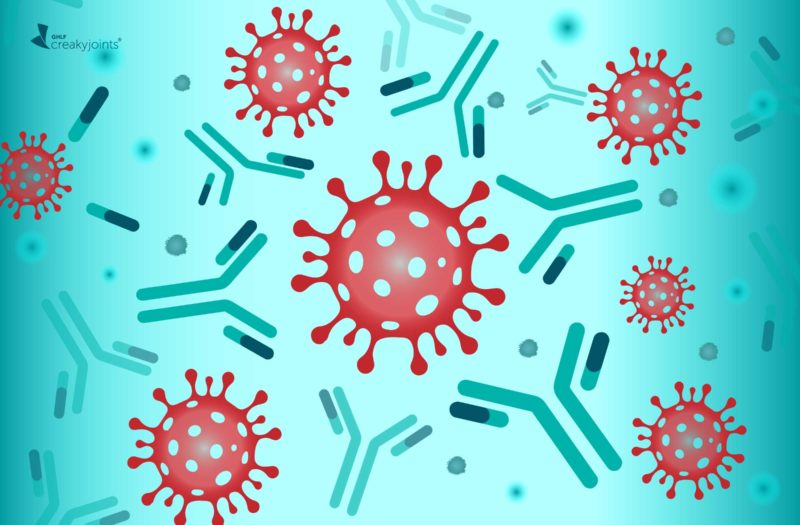Learn more about our FREE COVID-19 Patient Support Program for chronic illness patients and their loved ones.
Emerging research shows that people who have been previously infected with COVID-19 — and have antibodies as a result — may only need one dose of the COVID-19 vaccine to mount a significant immune response. However, no official guidelines have been changed to reflect this yet, and more research is needed.
In a small February preprint study (meaning it hasn’t been peer reviewed yet) posted on the preprint server medRxiv, researchers analyzed blood samples from individuals who already had COVID-19 before and after receiving the vaccine from Pfizer or Moderna. Just one dose of the either vaccine increased the antibodies in their blood by a thousandfold.
While research shows that the Pfizer and Moderna vaccines may be less effective against the B.1.351 variant identified in South Africa, researchers found that samples from these participants could neutralize both the B.1.351 variant and even the coronavirus responsible for the 2003 SARS epidemic.
Without the vaccine, these previously infected patients were only able to weakly neutralize the original Wuhan strain of the COVID-19 virus and sporadically neutralize the B.1.351 strain, underscoring the importance of getting vaccinated, even if you’ve had COVID-19.
In another small preprint study on medRxiv, New York University researchers found that those who recovered from COVID-19 saw a very large increase in their antibody levels when they received the first dose of the Pfizer vaccine, but a comparatively minimal increase after the second dose. On the other hand, those who had not had a previous COVID-19 infection experienced robust responses after each dose of the Pfizer vaccine.
“These data highlight an important gap in our knowledge and may have major implications for how these vaccines should be used to prevent COVID-19,” note the researchers.
It’s still unclear how these results may play out in real-world settings, and the U.S. Centers for Disease Control and Prevention (CDC) has not changed its guidance to recommend only one dose for those who have recovered from the virus — though some researchers are trying to persuade it to, according to the New York Times.
For now, it’s important to get both doses of the Pfizer or Moderna COVID-19 vaccine unless CDC recommendations change.
In the clinical trial that led to its authorization in the United States, the Pfizer vaccine had an efficacy rate of 52 percent after the first dose, per a December 2020 study published in the The New England Journal of Medicine. Meanwhile, the Moderna vaccine provided around 80 percent efficacy one month after the first dose, per the U.S. Food & Drug Administration. However, both vaccines have an efficacy rate of around 95 percent after both doses.
Here’s more on what you need to know about getting the second dose of the COVID-19 vaccine if you’re immunocompromised or have an autoimmune condition.
Get Free Coronavirus Support for Chronic Illness Patients
Join the Global Healthy Living Foundation’s free COVID-19 Support Program for chronic illness patients and their families. We will be providing updated information, community support, and other resources tailored specifically to your health and safety. Join now.
Mandavilli A. People Who Have Had Covid Should Get Single Vaccine Dose, Studies Suggest. The New York Times. February 19, 2021. https://www.nytimes.com/2021/02/19/health/covid-vaccine-single-dose.html.
Polack FP, et al. Safety and Efficacy of the BNT162b2 mRNA Covid-19 Vaccine. The New England Journal of Medicine. December 10, 2020. doi: https://doi.org/10.1056/NEJMoa2034577.
Stamatatos L, et al. Antibodies elicited by SARS-CoV-2 infection and boosted by vaccination neutralize an emerging variant and SARS-CoV-1. medRxiv. February 8, 2021. doi: https://doi.org/10.1101/2021.02.05.21251182.
Samanovic MI, et al. Poor antigen-specific responses to the second BNT162b2 mRNA vaccine dose in SARS-CoV-2-experienced individuals. medRxiv. February 9, 2021. https://doi.org/10.1101/2021.02.07.21251311.
Vaccines and Related Biological Products Advisory Committee Meeting. Food and Drug Administration. December 17, 2020. https://www.fda.gov/media/144434/download.






